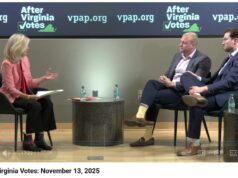
…a messy, expensive Democratic primary battle means Republican Caren Merrick has catapulted into front-runner status in the general election, as she can glide through the next few months picking up cash and promoting her image as a moderate soccer mom/entrepreneur who wants to represent all the district’s constituents.
Meanwhile, Areizaga-Soto and Favola will have to spend the time between now and August pandering to the district’s Democratic base and, after August, the nominee will have to pick up the pieces and try to promote party unity.
Got it? Primaries cost money, are divisive, and force candidates to the left (in Democratic primaries) and to the right (in Republican primaries). The lesson? Apparently, don’t ever have primaries, except perhaps in super-safe districts (and maybe not even there?).
To put it mildly, I disagree vehemently with this entire line of “argument.” Here’s my case for why contested primaries are actually very good things.
First, I’m going to borrow from one of the country’s smartest political bloggers, Chris Bowers, and specifically his 2009 Open Left article, Contested Primaries Help, Rather Than Hurt, Democrats in General Elections. Here’s Chris:
In making this proclamation [to avoid contested Democratic primaries, Pennsylvania Democratic Party] Chairman Rooney is relying on a longstanding bit of Democratic conventional wisdom. Namely, that closely contested Democratic primaries hurt Democratic chances in general elections. The problem with this theory is that there is no evidence to support it. In fact, a quick survey of the eight most closely contested Democratic Senate primaries in 2006 and 2008 shows that the winners of those primaries actually did pretty darn well in the general election (note: only campaigns where the general election was decided by 10% or less were examined)…
Bowers finds that Democrats who had been in tough primaries actually went 5-2-1 in general elections for U.S. Senate in 2006 and 2008. Not a bad winning percentage. Among other races he cites, Bowers includes one that many of us are extremely familiar with — the 2006 primary between Jim Webb and Harris Miller. Recall that when the Miller vs. Webb primary began, Webb had nothing – no staff, no money, no political experience, nada. Also, for those of us who worked closely with him during that period, we know that – to be diplomatic – he had a ways to go towards becoming a strong candidate, certainly one strong enough to take on the imposing (at the time) incumbent Senator George Allen in the general election.
And guess what, that’s exactly what the primary enabled Webb to do — improve big time! Thus, from February through June 2006, Webb – along with his campaign and grassroots/netroots supporters – honed his message, improved his candidate skills, built his “ragtag army” (which eventually reached 12,000 or so), and basically proved the adage, “whatever doesn’t kill you makes you stronger.” As an added bonus, Democrats had the opportunity for a much-needed and important debate over the future of our party, whether the focus should be on “Jacksonian Democracy,” for instance, and whether we should nominate a lobbyist for outsourcing American jobs (who called himself an “Old Testament kinda guy” and said he’d gladly flip the switch on the electric chair) or an economic populist and social libertarian war hero and former Republican. That was an important debate to have, and for those of us who were part of it, we know how nasty it got, with accusations of misogyny, racism, and anti-Semitism thrown around, among others. Not only that, but Jim Webb ended up the primary campaign absolutely broke, even after loaning himself $100,000 to keep the staff paid and the lights on at headquarters.
So, all this divisiveness and nastiness was a general election disaster right? According to conventional Democratic “wisdom,” including by the likes of Dick Saslaw (who, by the way, strongly endorsed Harris Miller in that primary – ’nuff said), it certainly should have been. Yet, somehow, it wasn’t. In fact, as Chris Bowers points out, Webb came out of that primary with a boost in the polls, one that would grow all through the summer and into the fall. Webb also came out of that primary with a message that had been honed into three major themes, with a “ragtag army” that ultimately grew into an enormous movement, and with a professional campaign team that slowly but surely started to improve its game. Again, that’s exactly what primaries enable a candidate to do.
As for the bitter, divisive, expensive 2006 primary causing a disastrous, permanent schism in the Democratic Party, that didn’t happen either. Instead, the vast majority of Democrats united behind Jim Webb, just as they (nearly) always do after primaries, and just as Republicans (nearly) always do after their primaries. Why is that? In large part, it’s because there’s nothing like having a “common enemy” to bring people together. Also, the fact is that the vast majority of Democrats (and Republicans) are loyal, and in the end will vote/donate/campaign for their party’s nominee. That’s just the way it is, I have very little idea why anyone would think otherwise (and no, examples like Jimmy Carter are not good ones, as a million other things went wrong in 1980 that had nothing to do with the primary against Ted Kennedy).
A few more examples of what Chris Bowers and I are arguing? How about the bitter, divisive, nasty, vicious 2008 presidential primary between Hillary Clinton and Barack Obama, which at the time was seen by many Democrats as likely disastrous for the general election. Yeah, ask President McCain how that theory worked out. Heh. Also, I’d point to the 2010 Republican primaries in Virginia, which were rough and tumble themselves, yet which didn’t seem to do the “red team” any harm — just ask Representatives Rigell and Hurt about that.
As for the bitter, divisive, expensive 2009 Virginia Democratic gubernatorial primary, it’s true that we ended up losing the general election to Bob McDonnell, but that had essentially nothing to do with the fact that we had a primary. In fact, Creigh Deeds came out of that primary with the party 99.9% unified, with a boost in the polls that had Creigh pulling into a tie with McDonnell or even a narrow lead. So, no, don’t blame the primary for what eventually unfolded in that disaster of a campaign, and disaster of a year, for Democrats. That’s just completely flawed reasoning, of the “Post hoc ergo propter hoc” variety. Complete logic FAIL, in other words.
In fact, as Chris Bowers points out, “There simply is no evidence that contested primaries hurt Democratic Senate candidates.” None. If anything, Bowers adds, “the evidence is that these primaries help Democratic Senate candidates.” Which is why the fact that “so many Democratic Party leaders seek to avoid contested primaries is difficult to comprehend.”
In the case of the 31st State Senate district race, it’s even more “difficult to comprehend,” given the argument made by Dick Saslaw that the new 31st district is quite safe for the Democrats. If that’s true, then what possible harm could there be in holding a primary, just as is happening in the also-safe 30th Senate district just down the road? And if what Saslaw argues is not true, then why are Saslaw and his apologists telling everyone would a great redistricting plan this is? Sorry, but Saslaw et al can’t have it both ways, as much as they might try to do so. So why do they make this argument? To paraphrase a smart Democratic friend, the argument that primaries are harmful always seems to come from the camps of candidates whose chances of winning nominations would be hurt by a primary.” Funny how it works out that way, huh? 😉
Finally, I’d just add that, even if all of the above evidence weren’t true – which it is, big time! – I’d still make a strong case for primaries. Why? Well, I know this is quaint and all, but there’s this little thing you all might have heard of known as “democracy?” You know, that thing are grandparents fought World War II to defend? Yeah, I told you it was quaint.
In all seriousness, though, how can anyone calling themselves a “Democrat” not be a committed “democrat” as well? As Jaime Areizaga-Soto put it Wednesday night at the Arlington County Democratic Committee meeting – to huge cheers, I might add – “the voters of the 31st district will now decide who will be their Senator, instead of the other way around.” You can replace “31st” with whatever other district you’d like, and the same rule holds. Barring some overwhelming reason to the contrary (and I can’t really think of any), Democracy should always be allowed to flourish, even (gasp!) be encouraged by the “powers that be,” in the United States of America. That is, unless they have other agendas (personal power? control? favors to wealthy donors?) they care more about? Hmmmm.













![[UPDATED with Jim Ryan’s Letter] In Response to Youngkin’s “Sad, Whiny” Letter to Spanberger About UVA, VA Senate Majority Leader Surovell Says He’s “truly embarrassed for Gov Youngkin…After 4 yrs he has no understanding of basic VA govt structure”](https://bluevirginia.us/wp-content/uploads/2025/11/youngkinspanuva3-100x75.jpg)